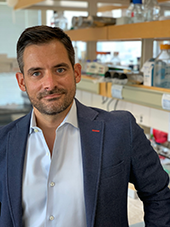Skip to content. | Skip to navigation
Personal tools

- Contact Us |
- Seminars |
- Donate

Lunenfeld-Tanenbaum Research Institute
Mount Sinai Hospital
Joseph & Wolf Lebovic Health Complex
1084 — 600 University
Toronto, Ontario
M5G 1X5
Tel.: 416-586-4800 ext.8262
► Web of Science Researcher ID
AAL-1470-2020
Dr. Daniel Schramek
SENIOR INVESTIGATOR
Dr. Daniel Schramek joined the LTRI in April 2015. He trained in Europe, Australia and the US, receiving a BA and an MSc in Molecular Biology, a PhD in Genetics and an Executive MSc in Technology Management. He trained as a postdoctoral fellow and Emerald Foundation Young Investigator at the Rockefeller University (NY).
Dr. Schramek’s vision is to leverage functional genomics to make major advances in treating human cancers in a personalized and highly specific manner by analyzing the exact molecular underpinnings why a tumour develops. A tumour accumulates hundreds of gene mutations but which of those mutation or combination of mutations initiate tumour development and controls metastases? Dr. Schramek has developed a new technique that can weed out the random genetic bystander mutations and identify the ones that are critical for cancer as those have diagnostic and therapeutic implications. His new technique takes advantage of CRISPR/Cas9 genome editing technologies, a specific process whereby short RNA pieces can be programed to destroy, reduce or activate the function of specific genes. These ‘small guide’ RNA molecules are first packaged into highly concentrated viruses and then injected into the embryonic sac of a developing mouse embryo using ultrasound to guide the injection needle. Using this method Dr. Schramek’s team can assess up to 300 potential cancer genes in a specific organ in an adult mouse in as little as five weeks.
Previously, Dr. Schramek focused his research efforts on Head & Neck Squamous Cell Carcinomas (HNSCCs), one of the most common and deadliest cancers, and could identify several new tumour suppressor genes. He also designed a new therapeutic strategy specifically for patients who carry mutations in one of those new genes. Now, he is working to elucidate the driving mutations in breast, brain and pancreas cancer and will also use his unique technique to find not only genes which cause cancer but also the genes which are required for tumour growth – the quest for a tumour’s Achilles’ heel.
His breakthrough technologies have been recognized with professional awards such as the Regeneron Innovation Award and the Alois Sonnleitner Prize for Outstanding Cancer Research by the Austrian Academy. He was also named Anna D. Barker Fellow in Basic Cancer Research by the AACR as well as the CCSDP New PI Award by the Canadian Institutes of Health Research (CIHR).
At a Glance
Dr. Schramek's research focuses on leveraging functional genomics to make major advances in treating human cancers in a personalized and highly specific manner by identifying and characterizing why a tumour develops.
One of his biggest contributions to this field so far has been to elucidate the molecular link between synthetic hormones, stem cells and breast cancer.
Major Research Activities
His work focuses on mutations and genes responsible for tumorigenesis and metastasis, and aims to further improve current cancer therapies and treatment for HNSCC, breast, brain and pancreas cancer patients. His goal is to also discover the driving mutations in breast and bladder cancer and will use the unique direct in vivo CRISPR/Cas9 technique that he has created, in order to find all the genes required for tumor growth – the quest for a tumour’s Achilles’ heel. In addition to elucidating the basic molecular and cellular mechanisms involved in tumorigenesis, he will maintain a clinical perspective of research in the lab by collaborating with clinicians at Mount Sinai Hospital such as Dr. Steven Gallinger, Hepatobiliary/pancreatic (HPB) surgical oncologist, or Dr. Pamela Goodwin, breast cancer oncologist.



